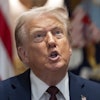BEIJING (AP) — Despite criticisms, Beijing has been steadily gathering support for its "Belt and Road" initiative, which aims to weave a network of ports, bridges and power plants linking China with Africa, Europe and beyond.
Italian Premier Giuseppe Conte has pledged to sign a memorandum of understanding this week on supporting the initiative during a visit by Chinese President Xi Jinping, who has made it a signature policy of his administration.
Italy's involvement would give China a crucial inroad into western Europe and a symbolic boost in its economic tug-of-war with the United States.
Italy would be the first member of the G-7, a group of seven major economies that includes the United States, to join Belt and Road, following Portugal's embrace of the initiative in December. It appears to be driven partly by hopes that Chinese investment in Italy's ports might help revive the country's traditional role as a key link in trade between the East and West.
The Belt and Road program is a loosely defined umbrella for predominantly China-financed — and usually China-built — projects in more than 60 countries from the South Pacific through Asia to Africa and Europe.
As President Donald Trump squares off with China over trade and other issues, gaining Italy's support is a coup for Beijing.
"It's important for the Xi administration to show that you have Portugal and Italy, two well-known countries in western Europe breaking ranks with the western alliance in BRI," said Willy Lam, an adjunct professor of China studies at the Chinese University of Hong Kong.
China says some 150 countries have signed Belt and Road related agreements since the program's launch more than five years ago. A major conference is planned next month in Beijing, marking further expansion of the initiative.
Beijing has marketed the initiative as a way to give some of the world's neediest countries a leg up, helping them gain access to more trade and investment. But it also helps Chinese companies tap new markets for their products while, inevitably, helping Beijing amass greater global influence.
Some governments including the United States, Japan and India worry that Beijing is trying to build a China-centered sphere of influence that would undermine their own sway, pulling developing nations into so-called "debt traps," that would give China ever-more control over their territories and economies.
China already has made inroads in Eastern Europe through investments in railways, ports and steel mills. That's stirred fears of a growing divide within the 28-member European Union between its wealthier and poorer members. Some also worry Chinese-led projects might undercut the bloc's standards on transparency.
As the U.S. takes on long-standing complaints of Chinese intellectual property theft and unfair trade practices, a Chinese win in Italy could boost Beijing's arguments that it is ultimately a force for good in the global economy.
China's official position is that Belt and Road is solely an economic initiative with no political motives. Xi said in a speech late last year that even as China moves closer to the center of the world stage, it will never seek hegemony.
"The Belt and Road Initiative in nature is an economic strategy," said Chu Yin, a researcher at the Center for China and Globalization, a think tank in Beijing affiliated with the government and with the ruling Communist Party.
"China has no intention to become a global hegemon and nor does China have such an ability," he said.
Launched in 2013, the initiative is at heart a business venture, not aid. China wants to attract non-Chinese investors but that has happened only on a few of the hundreds of projects, which range from oil drilling in Siberia to construction of ports in Southeast Asia, railways in Eastern Europe and power plants in the Middle East.
The initiative has run into some roadblocks in the past year, as the Chinese economy cooled and the U.S. and others accused Beijing of saddling developing countries with too much debt. Some governments including Thailand, Tanzania, Sri Lanka and Nepal have scrapped, scaled back or renegotiated projects amid complaints that they are too costly and give too little work to local contractors
Last year, Malaysian Prime Minister Mahathir Mohamad canceled projects including a $20 billion railway he said his country cannot afford. And in 2017, December, Sri Lanka sold control of its port of Hambantota to a Chinese state-owned company after falling behind in repaying $1.5 billion in loans from Beijing.
___
Moritsugu contributed from Tokyo. Researcher Yu Bing in Beijing contributed to this story.






















